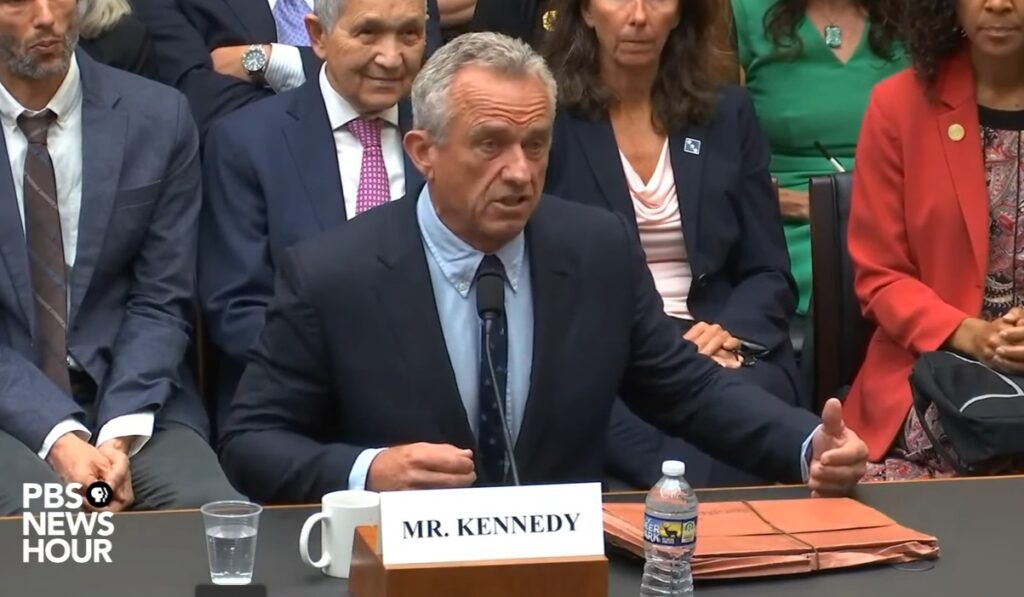Originally Authored at TheFederalist.com

Stocks for the food and pharmaceutical industries plummeted Friday immediately upon President-elect Donald Trump’s nomination of Robert F. Kennedy Jr. to lead the Department of Health and Human Services (HHS).
If confirmed as head of HHS, Kennedy will oversee a nearly $2 trillion department responsible for the administration of federal health insurance programs in addition to regulatory agencies governing food and medicine. HHS holds jurisdiction over the National Institutes of Health (NIH), the Centers for Disease Control and Prevention (CDC), and the Food and Drug Administration (FDA), making HHS a primary recruitment ground for the pharmaceutical companies’ revolving doors of influence. Kennedy, who ran for president and then campaigned for Trump as a chief antagonist of Big Pharma, has the industry bracing for generational changes threatening Wall Street’s bottom line.
Lawmakers on the Senate Finance Committee, however, will vote first on Kennedy’s nomination after raking in hundreds of thousands of dollars in contributions from the pharmaceutical industry now concerned about Kennedy’s plans to gut predatory advertising practices and eliminate taxpayer subsidies.
While most Republican senators have remained largely silent on how they might vote on Kennedy’s confirmation, pharmaceutical lobbyists are almost certainly calling lawmakers after drug money lined campaign coffers of both parties.
According to a Federalist analysis of industry donations to members of the Senate Finance Committee compiled by OpenSecrets, pharmaceutical companies contributed more than $6.7 million between 2019 and 2024 to lawmakers who will determine whether Kennedy gets a full vote by the upper chamber. Republican senators took more than twice as much industry money, though five members were excluded from The Federalist’s analysis because two lost their recent races, two are retiring, and one, Sen. George Helmy of New Jersey, was appointed just a little over two months ago.
Sen. Catherine Cortez Masto of Nevada was the highest recipient of pharmaceutical money among Democrats on the committee, having gotten nearly $460,000 over the last five years. Cortez Masto was followed by New Hampshire’s Maggie Hassan, who got more than $360,000, and Oregon’s Ron Wyden, who took in nearly $352,000.
On the Republican side, Sen. Thom Tillis of North Carolina has benefitted the most across all members of the Finance Committee with more than $679,000 in contributions. Sen. Bill Cassidy of Louisiana came in a close second on the committee with more than $667,000 in pharmaceutical receipts, and Sen. Tim Scott of South Carolina came in third with nearly $564,000.
Republicans overall brought in nearly $5 million from the pharmaceutical industry across 13 members while Democrats raised more than $1.7 million across 9.
While lawmakers have raised millions from pharmaceutical companies anxious about Kennedy presiding over the nation’s premier public health agency, such donations do not necessarily mean senators are inherently compromised. Republican Sen. Ron Johnson, for example, who received more than $124,000 from the industry over five years, has held a series of roundtables critical of the industry in the aftermath of the coronavirus lockdowns. Johnson’s most recent event featured a panel led by Kennedy in September.
“If America fails,” Kennedy said at the Senate roundtable, “the chief reason will be because we let our country get sicker, more depressed, fatter, more infertile at an increasing rate while crippling our national security, bankrupting our national budget with health care costs.”
“Every major pillar of the U.S. health care system as a statement of economic fact,” Kennedy added, “makes money when Americans get sick.”
Johnson already announced his support for Kennedy’s confirmation.
“I think he’ll do an extremely good job, because it’s kind of hard to refute the truth, and he’ll be laying out many truths,” Johnson told a local Wisconsin radio program.
